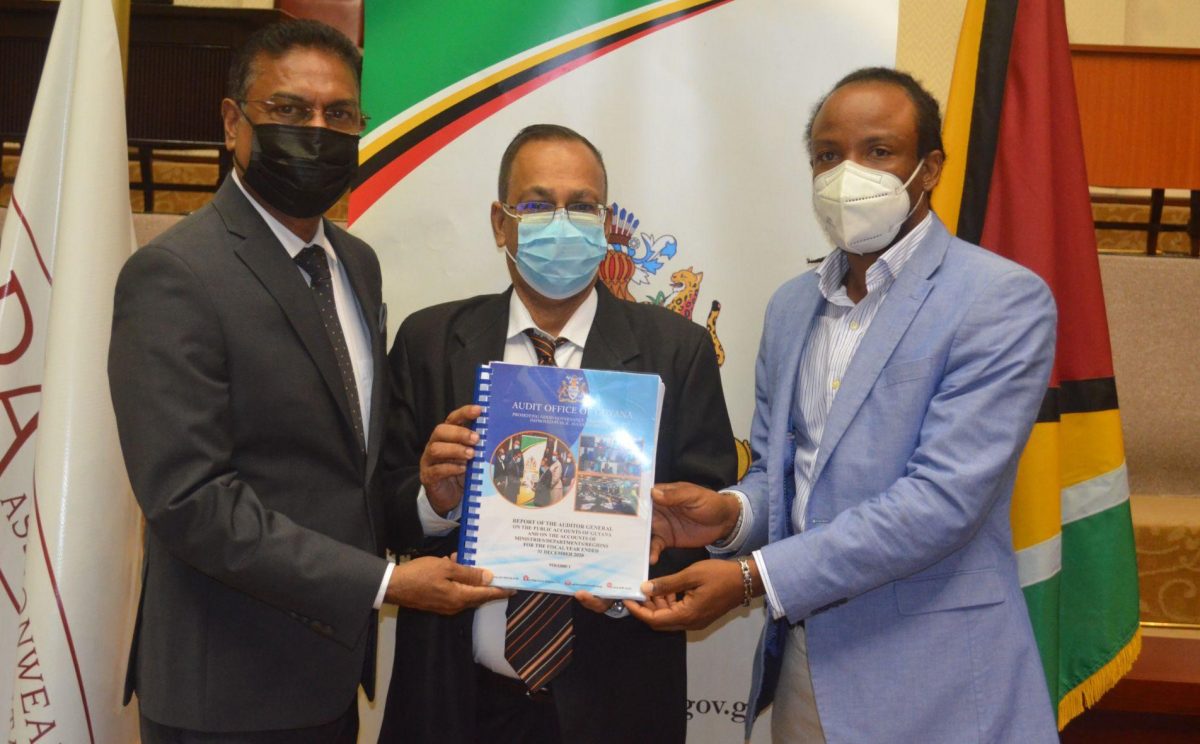Auditor General Deodat Sharma yesterday presented to the Speaker of the National Assembly his report on the public accounts for the fiscal year ended December 2020.
The report will be tabled in Parliament when the current annual recess ends. Yesterday’s presentation had originally been scheduled for the New Thriving Restaurant on Main Street but was shifted without explanation to the Arthur Chung Conference Centre (ACCC). The plan to use New Thriving had raised concerns in several quarters.
During the presentation at the ACCC, Sharma reaffirmed his office’s commitment to good governance, transparency and public accountability noting that in an attempt to mitigate the impact of the COVID-19 pandemic the Audit Office has aggressively embraced the government’s vaccine mandate.
“To date out of a total of 210 staff 195 are vaccinated representing 93% of staff strength,” he shared while assuring that the most up-to-date operating procedures, professional practices, technical standards and modern technology are incorporated and utilized in the execution of audits.
According to the AG the 17th report is also the 10th which was presented before the September 30 statutory deadline and does not reveal much since for most of the year there was no budget.
“In 2020 from January to September you had the (one-twelfth) budget so basically you had another budget from October so you won’t find much expenditure except for those couple months. It’s not for the whole year,” he explained.
Sharma added that in addition to its report the Audit office has completed four performance audits which will soon be submitted to the Speaker.
These audits were a direct result of training that the Performance Audit Unit received from the Canadian Auditing and Accountability Foundation (CAAF). So far 18 members of the unit have been trained by the CAAF and two are scheduled to be trained over a period of nine months.
This training which usually occurs in Canada will now be undertaken virtually as were several other staff development programmes.
“The Forensics Unit benefited from interviewing techniques and report writing facilitated by Arthur Lok Jack School of Business and training in several areas of forensic accounting and auditing through a technical cooperation agreement between Guyana and Jamaica which is funded by the Inter-American Development Bank (IDB),” he shared, adding that these development programmes are expected to yield audit reports that can withstand scrutiny in a Court of Law.
Additionally, as Chair of the Caribbean Organization of Supreme Audit Institutions (CAROSAI) Guyana was able to organise two webinars where experiences were shared on demystifying data analytics and auditing for fraud.
CAROSAI also hosted a training programme on root cause analysis facilitated by CAAF in which 40 members of CAROSAI participated.
The AG assured that the Audit office continues to prepare for its role in the oil and gas sector and explained that along with those already trained there is a staff member pursuing a master degree in oil and gas at the University of Bedfordshire while members in the performance audit section with help from CAAF are being trained on how to audit the oil and gas sector.
“The Audit office is working to achieve its mission to promote good governance, transparency and improved public accountability and with the continual support of all stakeholders I am certain our mission will be realised,” he shared.
Asked to provide an update on the special audit of the COVID-19 Cash Grant programme, the AG stated that it was moving slowly and currently has no timeline for completion.
“The cash grant system presently we are auditing it. They submitted the financial statement. The staff was doing the audit for 2020. I visited Region 2 to ensure Guyanese people are receiving the money or to ask if they have complaints,” he said, adding that it is taking a bit of time because it is across all regions and the pandemic makes travelling unpredictable.
“One day we are there and the next we have COVID-19 issues so some Regions have been locked and we can’t go in as usual. Wherever I have my staff they have been checking on the payment and if the press has any information on complaints you are welcome to forward it,” Sharma stated.
He noted that there is a specific portal on the Audit Office website to allow for complaints and invited members of the public to utilise the system.
Other audits which are ongoing include the audit of City Hall.
Sharma stated that his office has been forced to return to the City Administration’s financial statements for the years 2019 and 2020 because they were not prepared in compliance with the regulations.
“The balance sheet just has a list of budgeted assets, that’s not how you prepare your balance sheet. There is also a gap of several years in the financial report from the City. They have submitted financial reports for 2019 and 2020 but the last audit was in 2004,” he lamented.
The AG reminded that he has repeatedly advised not just City Hall but several other defaulting agencies to start over.
“Let’s close the books and open new books. Take an asset count of what is there, get a new bank account and everything. It doesn’t make sense to go back to 2005/2006. Let’s sit down and list all the assets. List all the cash positions and let’s start a new balance sheet at least from now on your accounts can be audited,” he maintained before explaining that at City Hall only 10% of his recommendations are being followed.
Elsewhere, accounting officers are taking recommendations more seriously.
“We have met virtually and most have answered queries and provided answers so we can adjust the report,” Sharma shared.






